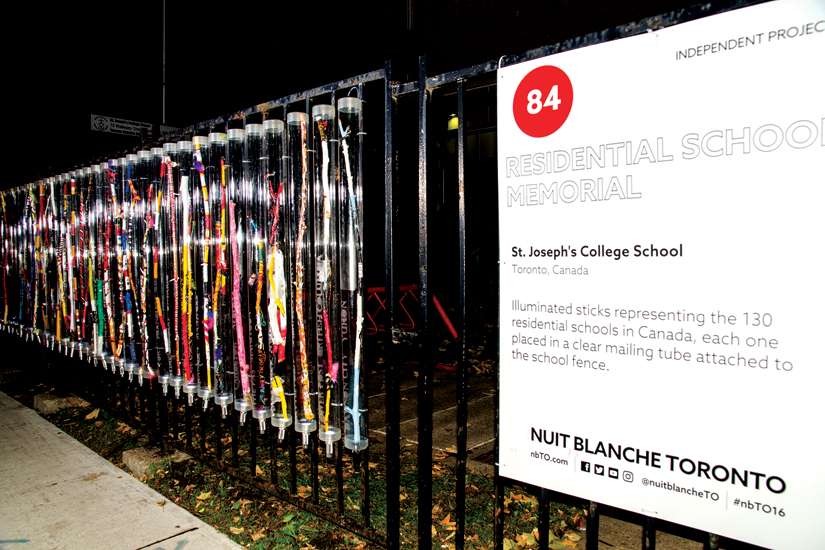Two years in the making, the project consists of 130 talking sticks, decorated staffs used in many aboriginal cultures to designate the speaker among a group, which were sealed in clear mailing tubes and fixed to the fence outside the school. Each tube — one for each of the residential schools operated across Canada — also contained a light to illuminate the stick during the 11th edition of the overnight contemporary art exhibit in Toronto, held this year Oct. 1-2, as well as a name of a residential school.
“A lot of the residential schools were actually to assimilate the aboriginal people into the Catholic religion and a lot of the people who ran the schools were Catholics,” said Keelin Lawor, president of the school’s art club. “So much has happened and such an impact was felt by these schools. We have to recognize that a lot of this was done by us and our forefathers.”
Funded by the federal government, these schools first appeared in the 19th century. By 1931, the peak of the residential school system, about 80 schools were in operation across Canada. In total 130 residential schools existed across Canada.
These schools — the last one closed in 1996 — were attended by about 150,000 First Nations, Inuit and Metis children who had been removed from their community. Many were abused physically, mentally and sexually. Some would never see their parents again.
“People who endured it don’t even want to talk about it because they don’t want to have to go through it again,” said the 17-year-old Lawor. “(But) it happened and we can’t forget that.”
Kristy Doyle, who visited the Residential Schools Memorial Wall during Nuit Blanche, said we can’t forget our past.
“Different cultures have a darker past than others but everyone should know the past so that we can learn from it and have a brighter future in general for everyone,” said the 25-year-old.
And that’s the idea behind the exhibit, to get people talking about residential schools and their legacy.
“The more people that know the more people that can become connected to the issues and the more that can be done,” said Paul Sabyan, the teacher behind the project.
Once removed from the school’s fence the project will continue to generate conversation about residential schools among Catholics in Toronto.
“My plan is that once this installation is done tonight to take it apart and send each of the tubes to 130 different schools in our board with the idea that they’ll start talking about it,” said Sabyan. “It is really important for the students to be aware of that (part of history). They really are the ambassadors of this knowledge.”
And while Sabyan focuses on spreading the conversation across the Toronto Catholic District School Board, Lawor wants people from coast to coast talking about what many have tried to forget.
“As a nation we have to recognize what we have done and we have to stop erasing the fact that this is something that we did and we have to make up for it. We have to stand up and tell our government that we need to respect these people because we are not the ones who were originally here, they were. The erasing of these things has to stop.”

